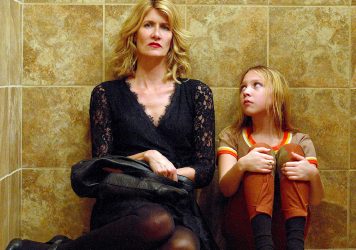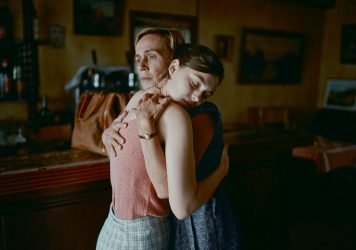Belgian filmmaker Emmanuelle Nicot approaches the subject of child sexual abuse with great sensitivity in her debut feature.
“I’m not a girl, I’m a woman,” are the stabbing words spoken by Dalva (Zelda Samson), a 12-year-old who wears heavy makeup, scrapes her hair into a bun and dresses in middle-aged women’s clothes. The film opens with officers taking Dalva’s father Jacques (Jean-Louis Coulloc’h) away. The camera resists lingering on Jacques, clutching onto Dalva’s gaze and capturing every flinch and tear of pain.
Enraged and confused as to why she’s been ripped away from her father and placed into a temporary care home, Dalva initially refuses to comply with her new social worker Jayden (Alexis Maneti). She demands to be reunited with her father, who she only refers to by his first name, and the film unpacks the complexity of controlling relationships through Dalva’s eventual interactions with Jayden.
It’s a fragile subject matter to explore. But when one in 20 children have been abused in the UK, it’s also a harrowing reality. Nicot previously volunteered at an emergency youth centre, where she learned the story of a six-year-old girl who had lived alone with her father, who sexually abused her.
The characters in Love According to Dalva are fictitious, but the story reflects reality. Nicot’s debut offers sensitive and intimate insight into the lives experienced by too many. Handled with delicacy and bravery, Nicot has crafted a powerful anatomy of the imprint of sexual abuse. Love According to Dalva is a voice for those who can’t speak out.
Little White Lies is committed to championing great movies and the talented people who make them.
Published 26 Apr 2023
Heavy subject matter treated with a light touch. Who knows which way this could go?
Tactfully-mounted drama with stand-out turn from young lead Zelda Samson.
Speaks to a problem that sadly exists beyond the walls of the cinema.

There’s magic in every stop-motion frame of this miniature gem from Claude Barras and Céline Sciamma.

Jennifer Fox’s autobiographical debut makes for harrowing but essential viewing.

Audrey Diwan’s significant and unflinching adaptation of Annie Erneux’s memoir of a teen abortion is one of the year’s best films.